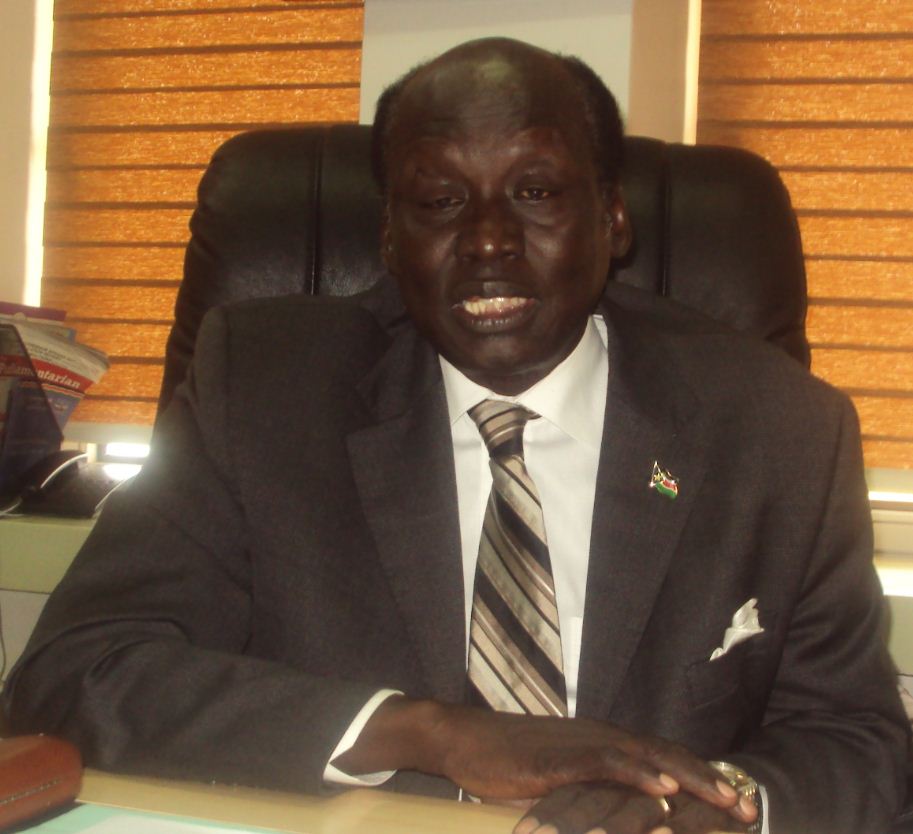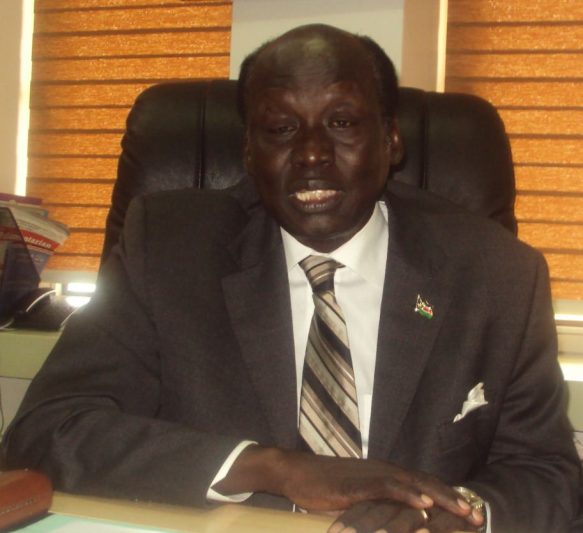
Before the independence of South Sudan, the then Sudan was synonymous with grabbing local and international news headlines with its ever increasing cases of harassment and intimidation of the media. However, the separation of the two nations has introduced a new dimension to the topical issue of press freedom. Inspired by both the local and international goodwill it currently enjoys following its independence, the government of the new Republic of South Sudan has reaffirmed its commitment to promotion of a free and independent press.
Exuding confidence over its resolve to ensure a conducive media environment, the South Sudan government maintains that a lot of positive ground has been covered in improving the working conditions of journalists and the entire media environment.

In a candid and exclusive interview with Dr Barnabas Benjamin Marial, the Minister for Information in the Government of South Sudan (GoSS) The People’s Voice (PV) Editor Paul Jimbo sought the Minister’s views on the press freedom situation in the new state.
PV: What is your definition of the term ‘Freedom of Press’?
Minister: Freedom of expression is the cornerstone of the democratic process in any society keen on promoting human rights in all aspects of life. Since the days of struggle as the Sudanese People’s Liberation Movement (SPLM) and now as the government of the Republic of South Sudan, freedom of expression remains one of our major principle positions when it comes to governance. The cornerstone of our constitution is to build a just and democratic state and this cannot be realized without a free and independent press. This is why we are keen on promoting media development as a government because we understand the role it plays.
As far as our principles of building a democratic state are concerned, we believe that freedom of expression is the cornerstone of media development in the new state of South Sudan and we are very clear on this. We believe that the media is an important stakeholder in this process. This is why we have drafted the media laws with the input of all stakeholders. Journalists must also feel free to say what they want to say as long as it is within the media laws. The government would like to nurture a smooth democratic process in the new country. This means that the media must win the principle of freedom of expression.
PV: What is your assessment on the press freedom situation in South Sudan?
Minister: You can agree with me that as a government we have not had even our own newspaper since we signed the Comprehensive Peace Agreement (CPA). The peace deal signed between the north and south ended over 21 years of civil war that claimed millions of lives in the then Republic of Sudan. I think we are the first government in Africa to do without a government newspaper. We have so many FM radios, more than any other country in Africa; we have over 37 of them, church radio stations, civil society radio stations, and we do not even monitor what they say, we do not even have personnel to see what they broadcast, and the government only has a single radio and TV station. This alone is an indication of how we are moving towards ensuring there is truly freedom of press in South Sudan.
PV: Media laws are very important in walking the talk of press freedom; where are we with the media bill of South Sudan?
Minister: Yes we have the media bill currently in parliament; it we definitely be passed; it was taken to the Council of Ministers; we passed it and took it back to parliament but, there were some journalists who said that there were certain chapters which they felt needed to be rectified, so they themselves wrote to the president. That is why the president asked the assembly to withdraw those Bills so that the concerns raised by the journalists could be incorporated. Otherwise they would have been passed along time ago. Now the bill is back at the Ministry of Justice so that the new dimensions as demanded by the journalists are included before being taken back to parliament.
PV: Before South Sudan became independent, Sudan as a country earned itself a bad name, a state keen on muzzling press freedom by gagging the media. Now that the two sides, north and south have separated officially, what is the plan of the South Sudanese government to set records straight that there is a new order of doing things in the new state?
Minister: Absolutely right! We got the bad name because Sudan was one country and one hell bent on fighting the media; harassment was the order of the day and interestingly this happened in the north, places like Darfur and Khartoum. There were journalists killed in the north but, you know that in the history of the SPLM, there is no single journalist who has been killed in the south; show me today if you know of any. I think this is a very good record. Look at the journalists killed in Afghanistan, in Iraq and all those places where there is conflict, even in certain parts of Africa, including the Republic of Sudan in Khartoum, there are a lot of journalists who have lost their lives but, can you quote me a single journalist killed in Southern Sudan, in a situation where there was war going on for 21 years? Not even one. Is that not a good record?
Yes I believe there have been a few incidences that have happened to journalists in the South since the formation of our then interim government where journalists felt they were harassed. What would you expect when you are building institutions, when you are transforming a guerrilla army into a conventional one, and trying to put our judicial system in order? Definitely there are also issues of capacity where some of our security personnel have overstepped their mandate; it must be understood that they are still being trained. The journalists are also undergoing their own training so they must appreciate the situation as it is. You find a journalist that may have committed a traffic offence and when he is fined, he claims that he is being harassed as a journalist. This is the situation here, it is something which will calm down slowly until we find our feet. The fact that our constitution reflects freedom of expression should be something of comfort to our journalists. Now Miraya FM has been thrown out of the Republic of Sudan in Khartoum, where did they seek refuge? South Sudan. And, the following day they resumed full time broadcasting. If there was real media harassment, why would they run here? Is that not a good sign to show that actually South Sudan is media friendly?
PV: Your predecessors in this Ministry often accused the media of overstepping its mandate and even stepping on the feet of the government. How do you interpret this statement?
Minister: Let me tell you Jimbo; today, freedom of expression comes with responsibility and so you know very well what happened in Rwanda; the media caused the situation that led to a massacre that claimed over 800,000 lives; this is because the media abused its freedom. This is also what we are careful about; we do not want our media to fall on to that line. What my predecessors simply meant was to sound a warning to the media that the government remained concerned on the manner and behavior of the media. We cannot allow this [massacres like in Rwanda] to happen here on our watch. The government is a stakeholder as much as the journalists are.
PV: Does the government have any plans to set up a media training institution or academy to boost journalism standards in South Sudan?
Minister: Oh yes indeed, the way I look at this is that one day, many years ahead, when maturity has gained ground in the media, we may not even need to have a Minister for Information in the Republic of South Sudan. That is very possible if we develop smoothly towards freedom of expression in a manner which is in line with democratic principles. The end game of freedom of expression is that journalists themselves must be part and parcel of the very process and be patient in nurturing it; it’s a long process and it is my wish indeed, and I hope that the stakeholders appreciate every step towards press freedom.
